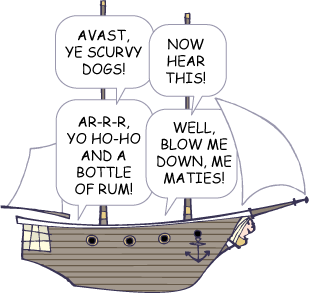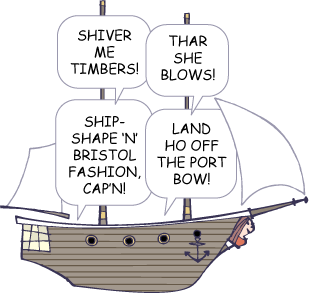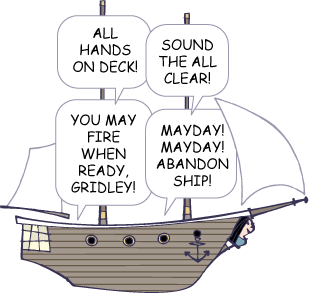Common Phrases with Nautical Origins
To hide distracting ship animation, click here.
To hide distracting ship animation, click here.













Even if you don’t sail or boat or go anywhere near water that doesn’t come out of a spigot or in a plastic bottle, you, too, can talk like a sailor. In fact, you already do. At times. Many everyday figures of speech have nautical origins. Many are obvious even to landlubbers who have no sea legs: i.e., plain sailing, batten down the hatches, a shot across the bow. Others only the saltiest old tar would know were ship born, if you’ll pardon the pun.
We start with “I suspected it might be” Sailor Lingo and continue through to “Who’d’ve figured?” Sea Dog Argot. Without further ado let’s get underway.
This means get going, you know, set sail. (Which is also sea talk, but we’re not doing that one.) But what way and why under it? ‘Way’ here doesn’t mean road or route (as in the way home) but is nautical speak for ‘the progress of a ship though the water,’ or the wake the ship leaves behind. ‘Way’ was used like that since at least the 17th century. Though no-one uses ‘way’ that way anymore.
So, are we under the wake when underway? Don’t think you’ll make much progress through the water that way. The ‘under’ was originally ‘on the.’ So, rather than under, we’re on the wake, or on the ship’s progress. ‘On the way’ eventually became ‘underway,’ possibly influenced by the Dutch word onderweg, which translates into English as ‘underway.’ Which sounds suspiciously circular, but that’s the story.
Don’t confuse underway with under sail, though they mean almost the same thing. The ‘under’ in that case is literal, the sails are at the top and the ship is under them. At least if you’re doing it right.
Which means stranded, without help or hope of recovery. Hardly a surprise this has a seafaring origin referring to a beached ship. ‘High’ means above the water, ‘dry’ implies it had been for some time and would likely remain that way.
Which is having skills, experience, being an old hand at something. Old sailing ships are positively chock full of ropes, you know, rigging. A sailor has to know which of these multiplicity of ropes is attached to what and what to do with them to make the ship work. They have to learn the ropes, and so then know the ropes. This is obviously an old nautical phrase.
Or is it? Some say it comes from the theater where stage hands also dealt with a whole smattering of ropes to work the curtains, sets and whatnot. But, we prefer sailors to actors so we like the first explanation better and are going with that.
This is a scornful response to an unbelieved fish story, a la a sarcastic, “Yeah, right. Pull the other one.” The marines in question are not the USMC but the Royal Marines of Ye Olde British Navy. Where exactly this comes from is unclear, but the earliest recorded versions have it “You may tell that to the marines, but the sailors will not believe it.” Apparently marines are gullible. Hey, they’re basically landlubbers after all, what do they know about sailing or fishing?
It means very drunk, which sailors have been know to be while spending money. There are dozens of other words and phrases for being blotto, smashed, plastered, but this one is colorful and nautical so we get to use it. The surprise in this saying is the sheets referred to aren’t sails, but ropes fixed to the lower corners of sails to hold them in place. If three sheets are loose the sails will flap and the boat will lurch about like a drunken sailor. And metaphorically vice-versa.
The original phrase was ‘three sheets in the wind’ and was falling down drunk on the sailor’s number of sheets scale of inebriation. One sheet to the wind was tipsy. The earliest written example is from The Journal of Rev. Francis Asbury of 1815, recounting his travels through Kentucky.
“The tavernkeepers were kind and polite, as Southern folks should be and as Southern folks ought not to be; they were sometimes two sheets in the wind. O, that liquid fire!”
Whether the good reverend got the phrase from the locals or brought it with him from his native England or coined it himself nobody knows for sure.
Here’s some terms you probably know, but might not have made the connection to seafaring. They aren’t all that obviously ship banter. They weren’t to us, at any rate.
Meaning crammed together cheek by jowl. Forget the cheeks or jowls, that’s got to do with pigs or something. Just think ‘jam-packed.’ Chocks are wedges holding wheels in place. Which maybe comes from choke. Who knows?
To zero in on the nautical bit we get to ‘block.’ As in block and tackle, a pulley system used on sailing ships to hoist the sails. ‘Chock-a-block’ describes what happens when sails are raised fully, when there is no more rope free and the blocks jam together as if chocked in place.
Which means at close contact with, especially in a military context. This one involves our favorite type of wordplay, a pair of heteronyms.
close (klōs) adj. Near.
close (klōz) trans.v. 1. To shut. 2. To bar or obstruct. 3. To enclose on all sides.
In the 17th century sailors laid protective barriers across a ship’s deck called close-fights. (Think ‘klōz’ and not ‘klōs.’) These structures closed off part of the ship as a defensive measure. By the mid 18th century that confined defensive space came to be called ‘close quarters.’ From An Universal Dictionary of the Marine, by William Falconer, 1769:
“Close-quarters, certain strong barriers of wood stretching across a merchant-ship in several places. They are used as a place of retreat when a ship is boarded by her adversary, and are … fitted with … loop holes, through which to fire.”
Over time ‘close quarters’ came to mean near enough for hand to hand combat. Though nowadays it just means close together, with or without any actual fighting. When exactly it went from klōz to klōs we simply don’t know. Pretty hard to suss out pronunciations from written sources, eh?
This is the shortened form of the earlier phrases ‘cut and run away’ and ‘cut and run off’. Some have it referring to ships making a quick getaway by cutting the anchor rope and running before the wind. Maybe. Another possibility is ‘cut’ doesn’t mean rope actually being severed, but is an allusion to cutting in the sense of passing straight though. You know, like cutting in line, taking cuts. Whatever the case it first appears in writing about ships, so it is indeed tar talk.
Most early references to this phrase relate to masts of sailing ships having fallen ‘by the board.’ The board is the side or the decking of a ship. It isn’t exactly clear whether the phrase originally meant ‘gone over the side’ or ‘fallen onto the deck.’ Still, either way it was out of use, kaput. From The Sailor’s Word-book: An Alphabetical Digest of Nautical Terms, by Admiral William Henry Smyth, 1865:
“By the board. Over the ship’s side. When a mast is carried away near the deck it is said to go by the board.”
These days lots of things besides masts go by the board. They get jettisoned. Which is also sailor talk, but we won’t go into that here.
This one you might have already guessed at the origin just from its appearing on the list. What did sailors drink to become drunken sailors? Grog, of course. Grog is a mixture of half rum and half water. From here it should be easy to connect the dots between grog and groggy.
The reader might ask, why is this diluted rum called grog? This bit is not so obvious. There was a coarsely-woven fabric called grogram, a shortened form of ‘gros-grain,’ meaning ‘coarse-grained.’ Enter an officer in the British Royal Navy who served with distinction in the West Indies and elsewhere, Admiral Edward Vernon. The good admiral was known for wearing grogram jackets for warmth and also for watering down his crew’s rum ration to make it less intoxicating. Vernon was nicknamed ‘Old Grog’ for his grogram attire and ‘grog’ was the name his crew contemptuously gave to the watery rum he foisted upon them.
OK, we admit this last one is a single word and not a phrase. So sue us.
These next four will probably surprise you as to their nautical origins. But, damn the torpedoes. Full speed ahead.
First, it’s not by in large. Next, we need to understand the old sailing terms ‘by’ and ‘large.’ The wind blowing from behind a ship’s direction of travel is said to be ‘large.’ ‘By’ means ‘in the general direction of.’ For sailors ‘by the wind’ would be heading into the wind, give or take six compass points. So, ‘by and large’ is the ability to sail downwind and also against the wind. Which might seem impossible unless you know how triangular sails work. But that’s another story, you’ll just have to trust us sailboats can sail into the wind.
Anyway, that’s where the phrase came from. How it came to mean ‘on the whole; generally speaking; all things considered’ is taken from the idea of how a ship could sail under any conditions, regardless. Don’t know if we made that clear, but the phrase has a nautical origin which is mostly what we care about.
What’s an ‘offing’ and what’s in it? Good question. Let’s dispense with one thing, it isn’t a shortening of ‘offering.’ The phrase starts to make sense once you know ‘the offing’ was old-timey seafaring speak for the part of the sea that can be seen from land, minus the bit near the shore. Early texts also have it as ‘offen’ or ‘offin.’ Someone on the lookout for a ship’s arrival would first see it far from shore ‘in the offing’ as it approached. ‘The offing’ is a noun formed from the adjective ‘off’, used since at least the 14th century to mean ‘away from’ –as in ‘casting off’ and ‘setting off.’
The current figurative meaning of the phrase to describe any event that is imminent began to be used in the U.S. about mid 19th century. An early example comes from Portland Reference Book and City Directory by S. (b) Beckett, 1850:
“We have known wives to forget that they had husbands..., especially when they supposed that a tax bill or a notification to do military duty was in the offing.”
Unless you’re selling sno-cones or slurpees there wouldn’t seem to be enough money in slush to fund much of anything let alone a cunning plan. Leave it to sailors to find a way. Which was to call something other than half-melted snow ‘slush.’ In the the 1700s fat or grease rendered from meat boiled aboard ship sailors called ‘slush’, or ‘slosh.’
Since folks back then were fat phobia free, this slush was a valuable commodity for cooking, making soap and whatnot. Selling slush to landlubbers in ports of call was a perk for ships’ cooks and crew. This perquisite (perk) became known as a ‘slush fund’ and eventually worked its way from ship to shore as a figure of speech where there was no actual slush of any kind involved.
While most folks don’t know this story, maybe the writers of The Simpsons did. In the episode “Lard of the Dance,” Homer and Bart concoct a scheme to make money by collecting and selling grease. They go after Groundskeeper Willie’s fat stores obtained from the school kitchen. Willie’s ‘retirement grease’ thus being a literal slush fund.
The word aback has the same construction as the words around, aloft, and aport. Tacking an A to the front means ‘in the direction of.’ So ‘around’ means in a circular (round) direction. ‘Aback’ means in a backward direction, toward the rear. In old seaman argot sails would be ‘aback’ when the wind blows them back against the supporting masts and spars.
Now we add the ‘taken’ bit. In the world of sailing in days of yore, when the wind turned abruptly so a ship was suddenly facing into the wind, the ship was said to be ‘taken aback.’ A 16th century written example comes from the Philosophical Transactions of the Royal Society:
“If they luff up, they will be taken aback, and run the hazard of being dismasted.”
The figurative use of meaning surprised rather than physically pushed back, came about in the 19th century. For instance Charles Dickens’ use of the phrase in his American Notes in 1842:
“I don’t think I was ever so taken aback in all my life.”
The original ‘tiding over’ was a seafaring term meaning ‘in the lack of wind to fill the sails, float with the tide.’ This usage was recorded by English seaman Captain John Smith (the Jamestown Colony guy) in his influential sailor’s manual A Sea Grammar, 1627, which includes this first known citation of ‘tide over’:
“To Tide ouer to a place, is to goe ouer with the Tide of ebbe or flood, and stop the contrary by anchoring till the next Tide.”
That meaning of tiding over was supplanted by the ‘coping with a short-term problem’ figurative usage in the early 1800s. This meaning alludes to the imagery of ships floating over obstacles on a rising tide. In the absence of wind you make do with what you got. We think that’s the gist of it.
Now we throw you a curve with phrases that sound nautical but may or not be.
A phrase meaning ‘to the last,’ a la dead enders. A bitt is a post on a ship’s deck for fastening cables and ropes. When a rope is played out to the bitter end there’s no more rope to be had, that’s all she wrote. Enter Captain John Smith with the earliest citation in print, Seaman’s Grammar, 1627:
“A Bitter is but the turne of a Cable about the Bits, and veare it out by little and little. And the Bitters end is that part of the Cable doth stay within boord.”
Sounds good, but it’s debatable whether that’s the true origin of the phrase. It might rather be the obvious. Bitter is bad tasting, unpleasant. Applying that to a losing effort might be all there is to it. The jury is out on this one.
The phrase ‘edging forward’ meaning slow but steady progress was first used in the 17th century, referring to a ship slowly advancing by repeated small tacking movements. As in Captain John Smith’s The generall historie of Virginia, New-England and the Summer Isles, 1624:
“After many tempests and foule weather, about the foureteenth of March we were in thirteene degrees and an halfe of Northerly latitude, where we descried a ship at hull; it being but a faire gale of wind, we edged towards her to see what she was.”
‘Edgeways or edgewise’ simply means ‘proceeding edge first’. You know, sidling. As in edging through small gaps in a crowd. This practice of ‘edging’ was used with reference to folks having conversations by David Abercromby, in Art of Converse, 1683:
“Without giving them so much time as to edge in a word.”
‘A word in edgewise’ (or edgeways) was an expression coined in the UK in the 1800s. Whether it comes from nautical edging is not certain. The first written example is from the 1821 play Twelve Precisely! or, A night at Dover:
Sir F. (Aside.): Curse me, if I can get a word in edgeways!
The allusion here is to pulling on a rope. The hand grasping the rope is in a fist, the open hand goes over the top to grab the rope forward of the fist. Repeat as needed. This is probably, but not definitely of naval origin. The earliest known reference to it doesn’t specifically mention ships. This term later turns up in William Glascock’s The naval Sketchbook, 1825:
“The French … weathered our wake, coming up with us, ‘hand over fist’, in three divisions.”
These days the term is used to suggest speed, especially in financial dealings, as in ‘making money, hand over fist.’ This alludes to grabbing fistfuls of money and pocketing it at a prodigious rate. This coming fast on the heels of the other is from The life and Writings of Major Jack Downing, by Seba Smith, 1833:
“They… clawed the money off of his table, hand over fist.”
This phrase has several meanings of different origins, but we only care about the most common one: a precarious or delicate case, on the razor’s edge, walking a tightrope, and like that. Whether this old phrase started asea or ashore is unclear.
This meaning is an allusion to ships or stagecoaches giving a glancing blow against some obstruction or other before continuing on its way. While a collision could spell disaster, a bump meant a narrow escape and the ship or coach could carry on. As defined by Admiral W. H. Smyth in Sailor’s Word-book, 1867:
“Touch-and-go, said of anything within an ace of ruin; as in rounding a ship very narrowly to escape rocks, &c., or when, under sail, she rubs against the ground with her keel, without much diminution of her velocity.”
Contrary to popular belief these two are NOT of nautical origin. Nobody really knows where either actually came from, though both have a number of colorful, more likely than not false folk etymologies.
Sailing ships were never noted for having some type of standard nine yards of sails. Anyway, a yard on a sailing ship was a cylindrical tapered spar slung across a mast for a sail to hang from. Still, ships didn’t typically have nine of them.
Pirates sometimes had monkeys, but they were’t brass. Old navy ships had ‘powder monkeys,’ boys that delivered charges for the guns. They weren’t brass, either. There was no device, of whatever metal, to hold canon balls aboard a ship called a monkey.
And that, as they say, is all she wrote. At least all we wrote. There are plenty more nautical terms in common everyday speech, but we’ve gone on long enough. Though we bet you’re wondering about the headline promise of “How to talk like a pirate.” Considering how nautical terms pepper the language without our even being aware of it, you already do.
© Terry Colon, 2018